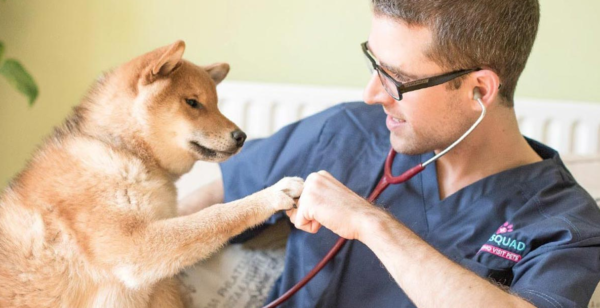Vet Visits for Puppies: 6 Things New Pet Owners Should Know
Category: Top Providers
Last Updated: May 29, 2020
Comments: 0
If you're the parent of a new puppy or thinking about getting one, it's reasonable to have questions about what kind of veterinarian visits your new pet will need. With vaccinations, dog checkups, and questions like “Is that normal?” it's beneficial to develop a good relationship with a veterinarian right away.
These early vet visits for puppies are one of the keys to your pet enjoy a long and happy life. There are 6 things that new pet owners should know about exams and checkups.

Pictured: Peter Hiscox
1. How Many Vet Visits Does a Puppy Need?
A puppy needs special care during the first months of life so she can grow up strong and healthy. Veterinarians recommend 3 monthly vet visits for puppies during early puppyhood, at about 6 to 8 weeks, 10 to 12 weeks, and 16 weeks of age.
These first visits are where your vet will perform wellness exams, administer necessary vaccinations, and answer your questions about other health concerns. If you don't plan to breed, you may schedule an additional vet visit for your puppy to get spayed or neutered between 8 weeks and 6 months old. You'll also need to see your veterinarian if your puppy gets sick or injured unexpectedly.
2. When Should You Take Your New Puppy to the Vet?
It's a good idea to take your new puppy for a vet examination as soon as possible after you get him home. Breeders often require you to get a vet exam within 3 days of taking home your new pet, while puppies from animal shelters and rescues benefit from a health check in case they've been exposed to contagious diseases by other shelter animals.
Once you've established a relationship with a new veterinarian, you can plan future appointments for vaccinations and puppy checkups. You should also bring your puppy in if he gets sick or injured. Ear infections, urinary tract infections, and injuries are common for puppies. And make sure to call your vet if you notice any of the following:
- Vomiting and diarrhea (if symptoms are frequent or prolonged)
- Loss of appetite
- Increased water consumption
- Oozing eyes
- Irregular urination
- Uncharacteristic irritability
3. What Happens at a Puppy's First Vet Visit?
At your puppy's first vet visit, you and your puppy will meet the veterinarian and the support staff and get to know the clinic. It's a great time to establish the all-important veterinary-client-patient relationship so that your vet can get to know what's normal for your pet and establish a baseline of health. This helps veterinarians be able to better diagnose and treat any medical conditions your puppy may later develop.
In the vet examination portion of your first visit, your veterinarian will:
- Weigh your puppy.
- Listen to the heart and lungs with a stethoscope.
- Take a rectal temperature reading.
- Examine the eyes, ears, nose, feet, and genitalia.
- Assess the condition of the skin and coat.
- Look at the teeth and mouth.
- Check the puppy's abdomen and lymph nodes for abnormalities.
- Test a feces sample for the presence of worms (roundworms are common in puppies).
- Discuss your puppy's history and answer your questions.
During the exam is a great time to ask any questions you have about feeding, medical issues, and future vet care, such as having your pet microchipped and spayed or neutered. If you are going home with any medications or treatments, your veterinarian will discuss when and how to give them to your puppy and make sure you understand the directions. At the end of your puppy's first vet visit, you'll schedule follow-up visits for wellness checks and vaccinations.
4. Do Dogs Need Annual Checkups?
Even after your dog is no longer a puppy, she'll still need annual checkups to help stay healthy. These routine wellness checkups give your vet a chance to examine your dog for any changes that might indicate a health problem. If a symptom develops over time, you might miss it since you see your dog every day. A vet will notice. Your veterinarian may also order diagnostic tests to check for issues that aren't showing any signs. This proactive approach can keep your pet healthier and save you money in the long run.
5. What Does a Dog Checkup Consist of?
When you visit your vet for annual dog checkups, your veterinarian will conduct a thorough examination of your pet, checking for many different symptoms and potential health issues.
Here are some of the things your vet might ask you about or cover in the exam:
- Check vaccination status and administer boosters as needed
- Order blood tests (especially for older dogs)
- Conduct urine tests, noting any discharge or discoloration
- Examine skin and coat for hair loss, lumps, rashes or other unusual spots
- Ask about digestion, including gas, indigestion or abnormal stools
- Check for coughing, wheezing, sneezing or nose and throat discharges
- Examine eyes and ears for discharge, swelling or redness
- Check on dental health, including teeth and breath smell
- Examine legs, paws, and nail health and check walking and standing
- Ask about food consumption and water intake
- Check for any intestinal parasites, fleas, ticks, mites or heartworms
- Ask about exercise levels and frequency
- Check the abdomen, organs, and lymph nodes for any abnormalities
- Ask about any behavioral issues such as excessive barking
6. How Often Should You Take Your Dog to the Vet for a Checkup?
How often your dog needs to go to the vet for routine checkups depends on her age. Young puppies need vaccinations and regular checkups to make sure they're healthy. As an adult, your dog doesn't need to see the vet quite as often. But once your dog is a senior, more frequent wellness checks are recommended.
Here's a sample schedule of what you can expect:
Puppies from Birth to One-Year-Old
- 6–8 Weeks: First DHLPPC vaccination (combined vaccine for distemper, hepatitis, leptospirosis, parainfluenza, parvo, and corona)
- 8+ Weeks: Microchipping
- 10–12 Weeks: DHLPPC vaccination booster
- 12–24 Weeks: First rabies vaccination
- 14–16 Weeks: Second DHLPPC vaccination booster
- 6 Months: Wellness check, and spaying or neutering
- Additional Vet Visits for Puppies: As needed if your puppy gets sick or injured
Adult Dogs from 1–7 Years Old
- Yearly Checkup: Vaccine boosters and wellness checkup
- Additional Veterinarian Visits: As needed if your dog gets sick or injured
Senior Dogs of 8+ Years Old
- Twice a Year: Wellness checkup and diagnostic testing (as needed)
- Additional Veterinarian Visits: As required if your dog gets sick or injured
No matter her age, if your pet gets sick or injured, you'll need to call your vet to schedule an additional visit beyond regular checkups. However, in an emergency, you may need to take your pet to the nearest animal hospital right away. The following situations and symptoms require immediate treatment:
- Hit by a car or heavy falling object
- Won't wake up
- Having trouble breathing
- Vomiting blood
- Have broken bones
- Having a seizure
- Has pale gums
- Has ingested a toxic substance
- Show signs of extreme pain
- Can't stand up
- Is suddenly disoriented
- Has a swollen hard abdomen
Why Do Vet Visits Matter for Puppies and Dogs?
Veterinarian visits are a normal part of pet ownership, helping you make sure your pet has a longer, happier life. You'll benefit from a vet's expertise and get all your own questions about your new puppy.
Vaccinations, checkups, and exams will help you avoid most health issues in your puppy before they even start. By developing a relationship with a vet early on, you'll ensure your new puppy gets the best care now and as an adult dog. With proactive attention to your pet's health, you will save money at the vet in the long run.
3 people found this helpful.
Our content is free because we may earn a commission when you click or make a purchase using our site.
Latest from out editors
0 comments







Write Your Own Comment